United Nations Passes Watered Down North Korean Sanctions
The Trump Administration's effort to impose sanctions against North Korea suffered a significant defeat in the United Nations Security Council.
Yesterday, the United Nations Security Council approved a new round of North Korean sanctions, but stopped short of imposing the far-reaching sanctions that the United States was originally advocating:
UNITED NATIONS — The United Nations Security Council on Monday ratcheted up sanctions yet again against North Korea, but they fell significantly short of the far-reaching penalties that the Trump administration had demanded just days ago.
While the sanctions were described in Washington and other capitals as the most extensive yet, in the end they amounted to another incremental increase of pressure on the country, even after it detonated its sixth and most powerful nuclear device.
It was far from clear that the additional penalties would accomplish what the Trump administration said was its goal: To force North Korea to halt its nuclear and ballistic missile tests and reopen some kind of negotiation toward eventual nuclear disarmament.
The North has claimed that last week’s detonation, in an underground site, had proven it could build a hydrogen bomb, far more powerful than ordinary atomic weapons. It is still unclear how far along the road to a hydrogen bomb the country has gone.
Although the resolution won backing from all 15 council members, the weakened penalties reflected the power of Russia and China. Both had objected to the original language calling for an oil embargo and other severe penalties — with President Vladimir V. Putin of Russia declaring last week that such additional sanctions would be counterproductive and possibly destabilizing.
Either could have used their status as permanent members of the Security Council to veto the measure.
The original demands from the United States for a new resolution, made by the American ambassador, Nikki R. Haley, were toned down in negotiations that followed with her Russian and Chinese counterparts.
Late Sunday night, after a series of closed-door meetings, a revised draft emerged, setting a cap on oil exports to North Korea, but not blocking them altogether.
The resolution asks countries around the world to inspect ships going in and out of North Korea’s ports (a provision put in place by the Security Council in 2009) but does not authorize the use of force for ships that do not comply, as the Trump administration had originally proposed.
The resolution also requires those inspections to be done with the consent of the countries where the ships are registered, which opens the door to violations. Under the latest resolution, those ships could face penalties, but the original language proposed by the United States had gone much further, empowering countries to interdict ships suspected of carrying weapons material or fuel into North Korea and to use “all necessary measures” — code for military force — to enforce compliance.
The resolution also does not impose a travel ban or asset freeze on Mr. Kim, as the original American draft had set out.
And the new measure adds a caveat to the original language that would have banned the import of North Korean laborers altogether, saying that countries should not provide work authorization papers unless necessary for humanitarian assistance or denuclearization.
The resolution does ban textile exports from North Korea, prohibits the sale of natural gas to North Korea and sets a cap on refined petroleum sales to the country of two million barrels per year. That would shave off roughly 10 percent of what North Korea currently gets from China, according to the U.S. Energy Information Agency.
Even so, American officials asserted that the resolution would reduce oil imports to North Korea by 30 percent.
China had long worried that an oil cutoff altogether would lead to North Korea’s collapse.
And even some British officials warned, in private, that if the original American proposal went forward, this winter the North Koreans would be showing photographs of freezing children, and portraying the West as architects of a genocide.
A recent analysis by the London-based International Institute for Strategic Studies suggested that an oil embargo would not have much impact in the long run anyway; Pyongyang, the analysis said, could replace oil with liquefied coal.
Despite the weakened penalties, Ms. Haley cast the resolution as a victory in her Security Council remarks.
Ms. Haley credited what she called President Trump’s relationship with his Chinese counterpart, Xi Jinping, in achieving the toughened sanctions — the second raft of United Nations penalties against North Korea since August.
Ms. Haley said the resolution demonstrated international unity against the regime in Pyongyang, and she claimed that the new sanctions, if enforced, would affect the vast majority of the country’s exports.
But in contrast to her assertion last week that the North was “begging for war,” Ms. Haley said on Monday that Pyongyang still has room to change course. “If it agrees to stop its nuclear program it can reclaim its future,” she said. “If it proves it can live in peace, the world will live in peace with it.”
Ultimately, analysts said, diplomatic success would be measured not by the strictness of sanctions, but by the ability of world powers to persuade Pyongyang to halt its nuclear and ballistic missile tests.
“There’s no only-sanctions strategy that will bring the North Koreans to heel,” said Daryl G. Kimball, executive director of the Arms Control Association, a disarmament advocacy group based in Washington. “It has to be paired with a pragmatic strategy of engagement. But those talks are not yet happening.”
In a nod to Chinese and Russian arguments, the resolution also calls for resolving the crisis “through peaceful, diplomatic and political means.” That is diplomatic code to engage in negotiations.
(…)
In reality, the Trump administration has relatively low expectations for the new sanctions, American officials say.
But it is discussing how to use them, the officials say, with a mix of overt military pressure, covert action, and steps to punish any Chinese banks that do business with North Korea, by banning them from also doing business with the United States.
That is exactly the combination of actions that was used by the Obama administration to drive Iran into negotiations over its nuclear activities for what became the 2015 deal that Mr. Trump has often denounced as a giveaway.
Kim Sengupta, writing at Great Britain’s The Independent, notes that these watered-down sanctions likely mean that Kim Jong Un’s place in power is likely safe for now. Vox’s Zeeshan Aleem, meanwhile, explains the logic behind Russia and China’s insistence that the sanctions be watered down:
Chinese and Russian negotiators ensured that the sanctions were watered down before they went for a vote. That’s because those countries bring a different set of calculations to the table when it comes to reining in North Korea’s fixation on becoming a global nuclear power.
China isn’t as worried about North Korea’s nuclear program as it is the potential collapse of the country itself, which would create a refugee crisis on the Korean Peninsula and likely send millions of North Koreans pouring across the Chinese-North Korean border.
China also believes the US would dramatically increase its military presence in the region to deal with the fallout from the collapse and to secure North Korea’s nuclear weapons. A US military presence on China’s border is not something China’s leaders want to see anytime soon. As a result, China helps prop up the North Korean leadership knowing that a stable North Korea serves as a strategic buffer for itself.
Russia is a more peripheral player on North Korea — it shares a much smaller border with the country, and its trade with Pyongyang is just a fraction of the trade between North Korea and China. But it has a very real interest in regional stability and keeping US presence in the area as limited as possible.
And some analysts believe that Moscow is also making a bid to become a power player in future negotiations with North Korea over its nuclear program outside of the UN.
“With Russia, this is not only about North Korea but about Moscow’s place in world politics,” Janka Oertel, a German Marshall Fund of the United States, told me in the runup to the vote.
Russia has been inviting American diplomats to Moscow to discuss the possibility of such talks. If Russia succeeds in securing a seat at the table during serious negotiations, it can use that diplomatic process to pursue its own interests and make yet another claim to being a major player in global affairs.
Aleem’s explanation makes sense, of course, and is well-established by other reports regarding North Korea that have been in the news of late, as well as the relationship between and among Russia, China, and the regime in Pyongyang. China’s concerns are related to territory, the possibility of a crisis on the peninsula, and the question of American troops on the border between China and North Korea, and the economic repercussions of both. Russia, on the other hand, seems to be mostly motivated by a desire to increase its relevance on the international stage and its ability to create bargaining chips and extract concessions from the Trump Administration on issues unrelated to North Korea such as North Korea, Ukraine, and the sanctions that have been imposed against Russia and Russian banks and businesses as a result of the actions of the Putin regime over the past two years. As such, the two nations have approached the crisis somewhat differently, with the Russians inviting American diplomats to Moscow in an effort to persuade them to see things from Moscow’s point of view. China, on the other hand, has preferred to work in the background via direct contact with American officials and discussions between President Xi and President Trump such as those that occurred earlier this year.
At the same time, though, it’s hard not to see this latest round of votes at the United Nations as yet another setback for American efforts to unite the international community behind a common strategy for dealing with North Korea. Had the oil embargo been included in the final sanctions package, then a significant source of energy that the Kim regime depends upon would have been cut off. Additionally, stronger language related to enforcement of such sanctions would have authorized American and other allied ships from intercepting commercial traffic headed for North Korea to inspect their cargo, something that significantly waters down the strength of the sanctions to the point where they are arguably merely words on a piece of paper backed only by the persuasive ability of the President, Secretary of State, or other American officials. They would do nothing to actually enforce the sanctions, or impose penalties on nations that seek to violate them. Therefore, it’s hard to argue that the Trump Administration actually lost this round and did so quite badly.
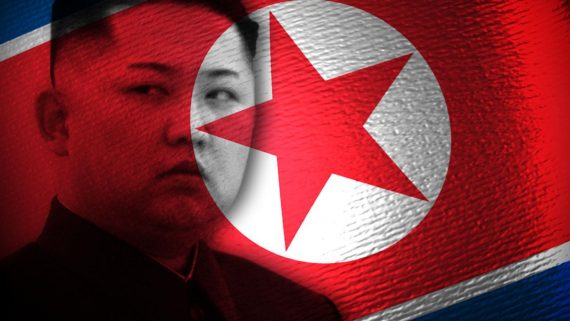

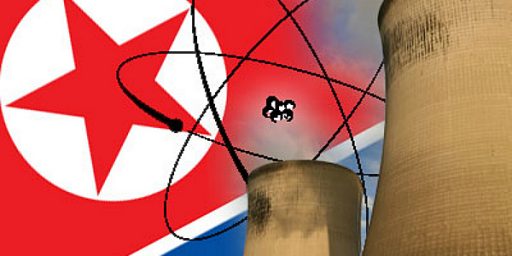
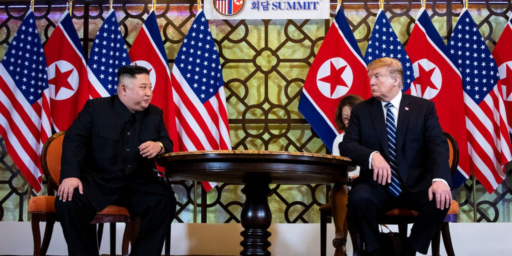
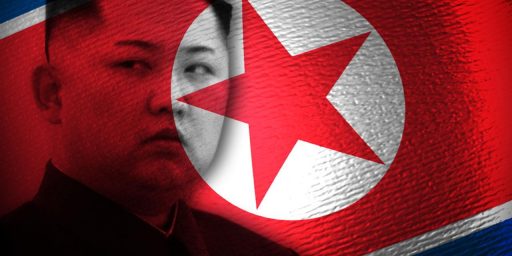

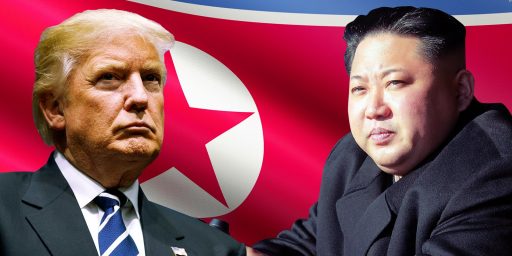
As I said the other day, the Trump policy is the Obama policy but LOUDER.
These sanctions are a waste of time, the hawk’s version of virtue signaling.
Time for the US and China to admit who’s really providing North Korea material support, and will use as cat’s paw against both.
The only sanctions that have even the slightest chance of stopping North Korea’s nuclear and ICBM development programs are sanctions against the Chinese government. We won’t impose those because they might hurt Apple’s and Walmart’s stock valuations.
Our best course of action is just to chill. North Korea is not presently an issue. It’s a risk. If the North Koreans are so foolish as to attack us, our allies, our interests or to attempt blackmail us or anything else of the like, they’ll be on their own—China has said as much and I believe them—and we should respond with all of the force at our disposal. Until that happens we should just chill.
Both China and Russia don’t like the 20 thousand American Troops in South Korea, and that’s why they will stall sanctions. There is no easy solution for that.
[********] is a crazy mad man who shouldn’t be trusted with control of nuclear weapons. It is impossible to overstate the danger that he presents to the world.
For most of the world and on this particular day in September, whose name goes in the blank more readily?
The Iraq Debacle taught dictators and despots around the world that if you don’t want the United States to invade your country, make sure you have nukes…yes, the little butterball at the top of the food chain in North Korea acts like a fool, but the desire to have nukes is completely rational…